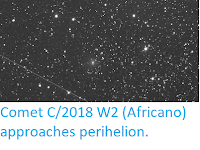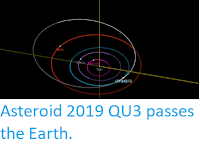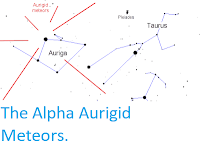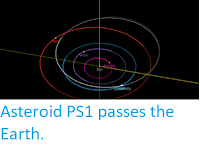Asteroid 2008 SJ82 passed by the Earth at a distance of about 10 102 000
km (26.3 times the average distance between the Earth and the Moon, or 6.75% of the distance between the Earth and the Sun), slightly before 0.30 am
GMT on Thursday 29 August 2019. There was no danger of
the asteroid hitting us, though were it to do so it would have
presented a significant threat. 2008 SJ82 has an estimated
equivalent
diameter of 140-430 m (i.e. it is estimated that a spherical object
with
the same volume would be 140-430 m in diameter), and an object of this
size would be predicted to be capable of
passing through the Earth's
atmosphere relatively intact, impacting the ground directly with an
explosion that would be between about 7500 and 182 000 times as
powerful
as the
Hiroshima
bomb. Such an impact would result in an impact crater between 2 and 7
km
in
diameter
and devastation on a global scale, as well as climatic effects that
would last decades or even centuries.
The calculated orbit of 2008 SJ82. JPL Small Body Database.
2008 SJ82 was
discovered on 26 September 2008 at Siding
Spring Observatory in Australia. The
designation 2008 SJ82 implies that it was the 2059th asteroid (asteroid J82 -
in numbering asteroids the letters A-Y, excluding I, are assigned
numbers from 1 to 24, with a number added to the end each time the
alphabet is ended, so that A = 1, A1 = 25, A2 = 49, etc., which means that J82 = 9 + (24 X 82) = 2059)
discovered in the second half of September 2008 (period 2008 S).
2008 SJ82 has a 1340 day orbital period and an eccentric orbit
tilted at an angle of 9.70° to the plane of the Solar System, which
takes it from 1.01 AU from the Sun (i.e. 101% of he average distance at
which the Earth orbits the Sun) to 3.75 AU from the Sun (i.e. 375% of
the
average distance at which the Earth orbits the Sun, roughly two-and-a-half times as far from the Sun as the Planet Mars). It is therefore
classed as an Amor Group Asteroid (an asteroid which comes close to the
Earth, but which is never closer to the Sun than the Earth is). As
an asteroid probably larger than 150 m in diameter that occasionally
comes within 0.05 AU of the Earth, 2008 SJ82 is also
classified as a Potentially Hazardous Asteroid. Close
encounters between the 2008 SJ82 and Earth are extremely common, with the
last having happened in September 2008 and the next predicted
in September 2020. 2008 SJ82 also
has frequent close encounters with the planet Jupiter, which it is
thought to have last passed in December 1991, and which it is next predicted to pass in October 2039 (although in this case 'close encounter' is relative, the asteroid never gets closer to Jupiter than Earth does to the Sun, but this is still close enough for for the giant planet's gravity to potentially affect its path.
See also...
Follow Sciency Thoughts on Facebook.







